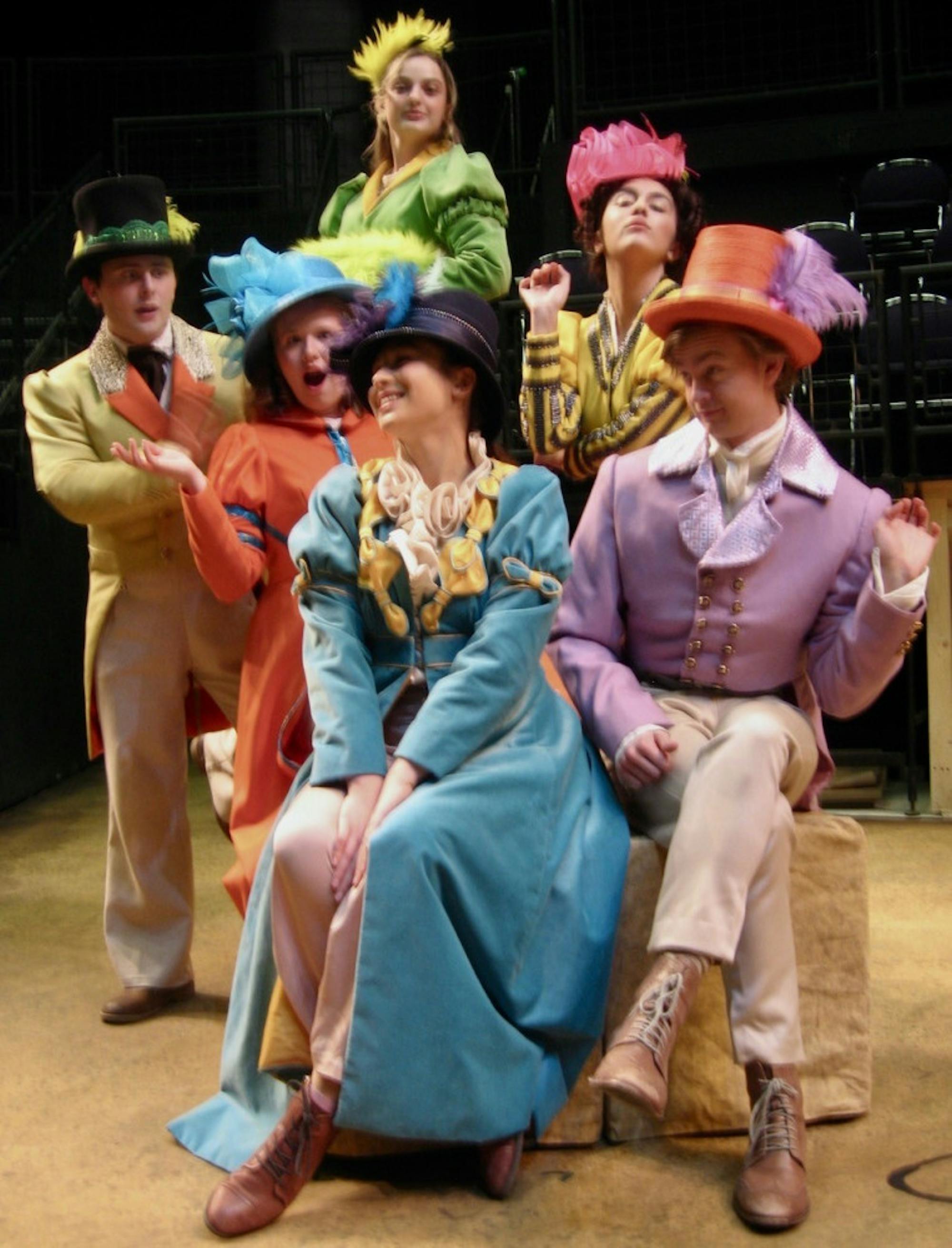Between the corsets, accents and obsession with propriety, experiencing a period drama can feel like stepping into another world. For some, that ability for escapism is part of its charm; for others, its rules can make the stories feel alienating.
Barbara Wallace Grossman, a professor in the Department of Theater, Dance, and Performance Studies and director of the department’s upcoming play “Sense and Sensibility” which is opening this weekend, chose Kate Hamill’s adaptation of the classic Jane Austen novel to reconcile these attitudes towards period stories.
Hamill’s adaptation, as well as Grossman’s production, seeks to bring “Sense and Sensibility” to a contemporary audience, blending the classical and contemporary to bring the already-relatable pieces of Austen’s work to a modern audience.
“I think when people first hear Jane Austen, they think of —as they should— Regency period, stiff, propriety [in] England,” first-year Charlotte Magee, who plays Elinor Dashwood, said. “And I think they may perhaps not think of it as somewhat intimidating, but as a separate world from our own. What I like about this production of ‘Sense and Sensibility’ is that the director, Barbara, has attempted to try and make it more relevant to modern day.”
“Sense and Sensibility” follows sisters Elinor and Marianne Dashwood as the sudden death of their father leaves them, their mother and their younger sister, Margaret, in financial turmoil. As they navigate their new circumstances, Elinor and Marianne also confront new suitors, all while society closely watches their actions.
“These are real people struggling with real issues like financial insecurity, economic instability, injustice [and] intolerance,” Grossman said. “And these are women who have agency within the more circumscribed norms of that world … What drew me particularly to this adaptation is that Hamill really wants us to see parallels to our world today.”
In this production, first-year Alexandra Everbach plays Marianne, the younger, more emotional of the elder Dashwood sisters. “She’s passionate and energetic and lively,” Everbach said. “She’s loyal to her sister, and I really love playing her.”
Elinor, on the other hand, remains more aware of society’s expectations of her and her sister. Magee described, “Elinor is a very level-headed, dutiful, good daughter … [she] prioritizes propriety above anything, and it’s interesting to see that difference between her and her sister Marianne, who is much more emotional and leads with her heart.” Magee said that balancing Elinor’s decorum with the emotional growth she experiences throughout the show has been an acting challenge: “Being able to play her has been extremely rewarding, if not a little difficult trying to strike that balance of propriety and emotional warmth.”
“I just really love how Jane Austen always gives her female characters — and female protagonists, especially — these very relatable qualities that transcend time. You can look at both Elinor and Marianne and see so many aspects of them that everyone can see in themselves,” she said.
While Austen’s original characters deal with relatable issues, this production of “Sense and Sensibility” blends period and contemporary elements to contextualize the story for a modern audience, including period remixes of modern songs and the incorporation of the Gossips, characters in Hamill’s adaptation who represent society’s scrutiny of our protagonists’ actions.
Grossman explained, “the Gossips, for [Hamill], represent the toxic impact of social media today, where people are constantly being judged … she uses the personification of the Gossips to really become this toxic force that has the potential to destroy the lives of the main characters and almost succeeds in doing it.”
Magee added, “they’re present in almost every scene, lurking around the edges of the stage, listening for bits of information that they can go and spread as well … I think there’s a particular scrutiny for the two sisters that can also be likened to all the scrutiny that women in the public eye tend to undergo that isn’t always the same for men.”
Grossman, Magee and Everbach all said that working on this particular production, especially working with this group, has been an incredibly rewarding experience.
“I could not have asked for a more wonderful group of people,” Grossman said. “Dedicated, conscientious, responsible, creative, imaginative, willing to take risks, incredibly supportive of one another, incredibly cooperative … My favorite part, as always, has been the creative collaboration. I think that’s what draws us to theater, both as audience members and as practitioners.”
For Everbach, getting to work with Grossman has been one of her favorite parts as well. “I’m so grateful that I get to work with her, especially my first year at Tufts. She gives you a lot of freedom on how to present your character … She directs you, but she also lets you make it your own.”
For Grossman, “Sense and Sensibility” has been an opportunity to engage in a story that is optimistic and celebrates positive themes.
“We live in a very difficult cultural moment where there’s so much anxiety, there’s so much acrimony, there’s so much anger, there’s so much noise that I felt I wanted to do something that wasn’t purely escapist,” Grossman said. “But on the other hand, I wanted to do something that celebrated the power of joy, goodness, faith, family, love, friendship, loyalty, dedication, civility, rather than the polar opposites.”
“It’s kind of for everyone. It’s not targeted for a specific audience. Whoever comes, you’re going to find something you love about it. There are so many aspects about it that people can relate to,” Everbach said.
“Sense and Sensibility” will be showing in the Balch Arena Theater Feb. 27-29 and March 5-7 at 8 p.m, with a March 7 matinee at 2 p.m. Tickets can be purchased at the Aidekman Box Office or online at Tufts Drama and Dance Tickets.
'Sense and Sensibility' to bring Austen's classic to modern audience

The cast of "Sense and Sensibility" rehearses for a production put on by the Department of Theater, Dance, and Performance Studies.





